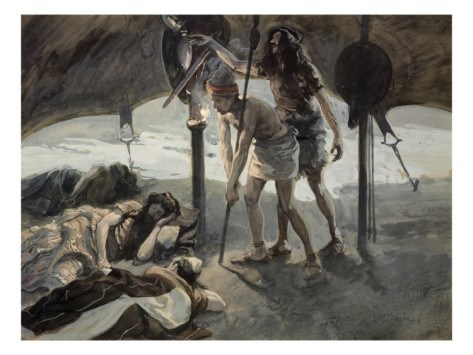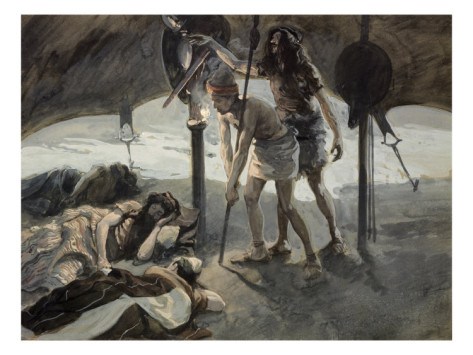
Central idea: Christ’s new law for the new person. Doctrine: Christ as the New Adam. Practical application: Living as New Adams and Eves ourselves.
To view Lectionary 81, click here.
Reading 1 1 Sm 26:2, 7-9, 12-13, 22-23
In those days, Saul went down to the desert of Ziph
with three thousand picked men of Israel,
to search for David in the desert of Ziph.
So David and Abishai went among Saul’s soldiers by night
and found Saul lying asleep within the barricade,
with his spear thrust into the ground at his head
and Abner and his men sleeping around him.
Abishai whispered to David:
“God has delivered your enemy into your grasp this day.
Let me nail him to the ground with one thrust of the spear;
I will not need a second thrust!”
But David said to Abishai, “Do not harm him,
for who can lay hands on the LORD’s anointed and remain unpunished?”
So David took the spear and the water jug from their place at Saul’s head,
and they got away without anyone’s seeing or knowing or awakening.
All remained asleep,
because the LORD had put them into a deep slumber.
Going across to an opposite slope,
David stood on a remote hilltop
at a great distance from Abner, son of Ner, and the troops.
He said: “Here is the king’s spear.
Let an attendant come over to get it.
The LORD will reward each man for his justice and faithfulness.
Today, though the LORD delivered you into my grasp,
I would not harm the LORD’s anointed.”
- Here David displays great human nobility and shows how he is a man after God’s own heart.
- Even though Saul was seeking to kill David, David did not repay Saul with death when he had the chance.
- David showed mercy to his enemy. In fact, David did not even consider Saul to be his enemy. David’s “justice” was remaining faithful to his king, even though the king was not being just to David.
- David proclaims that “the LORD will reward each man for his justice and faithfulness.”
- Thus, David lives Christ’s not-yet-proclaimed Gospel new precept, “Love your enemies.”
Responsorial Psalm Ps 103:1-2, 3-4, 8, 10, 12-13
R. The Lord is kind and merciful.
Bless the LORD, O my soul;
and all my being, bless his holy name.
Bless the LORD, O my soul,
and forget not all his benefits.He pardons all your iniquities,
heals all your ills.
He redeems your life from destruction,
crowns you with kindness and compassion.Merciful and gracious is the LORD,
slow to anger and abounding in kindness.
Not according to our sins does he deal with us,
nor does he requite us according to our crimes.As far as the east is from the west,
so far has he put our transgressions from us.
As a father has compassion on his children,
so the LORD has compassion on those who fear him.
- Each of us can ask ourselves, are the words of this psalm true for us?
- Do we find the Lord to be kind and merciful to us?
- Does he give us benefits?
- Does he forgive our sins?
- If we wish to be the kind of new man Christ wishes us to be, can we, assisted by grace, be toward our neighbor the way the Lord is toward us?
Reading 2 1 Cor 15:45-49
Brothers and sisters:
It is written, The first man, Adam, became a living being,
the last Adam a life-giving spirit.
But the spiritual was not first;
rather the natural and then the spiritual.
The first man was from the earth, earthly;
the second man, from heaven.
As was the earthly one, so also are the earthly,
and as is the heavenly one, so also are the heavenly.
Just as we have borne the image of the earthly one,
we shall also bear the image of the heavenly one.
- Jesus Christ is the New Adam.
- First, he assumed a human nature to his Divine Person.
- Second, he is the father of a new people, people who can live a natural life elevated to the order of grace.
Alleluia Jn 13:34
I give you a new commandment, says the Lord:
love one another as I have loved you.
- Christ has loved us by giving us the very best thing for us and it cost him his earthly life through great sacrifice.
- That is how we are to love one another. We are act for the true good of the other even to the point of sacrifice.
- David did this in regard to Saul.
Gospel Lk 6:27-38
Jesus said to his disciples:
“To you who hear I say,
love your enemies, do good to those who hate you,
bless those who curse you, pray for those who mistreat you.
To the person who strikes you on one cheek,
offer the other one as well,
and from the person who takes your cloak,
do not withhold even your tunic.
Give to everyone who asks of you,
and from the one who takes what is yours do not demand it back.
Do to others as you would have them do to you.
For if you love those who love you,
what credit is that to you?
Even sinners love those who love them.
And if you do good to those who do good to you,
what credit is that to you?
Even sinners do the same.
If you lend money to those from whom you expect repayment,
what credit is that to you?
Even sinners lend to sinners,
and get back the same amount.
But rather, love your enemies and do good to them,
and lend expecting nothing back;
then your reward will be great
and you will be children of the Most High,
for he himself is kind to the ungrateful and the wicked.
Be merciful, just as your Father is merciful.
“Stop judging and you will not be judged.
Stop condemning and you will not be condemned.
Forgive and you will be forgiven.
Give, and gifts will be given to you;
a good measure, packed together, shaken down, and overflowing,
will be poured into your lap.
For the measure with which you measure
will in return be measured out to you.”
- Christ is presenting to those “who can hear” a new law for a new kind of human being. The old fundamental law, which is part of human nature and can never be abolished, is to do justice, that is, to give to others what you owe them. But to justice, Christ is adding a law of generosity, mercy, and forgiveness. As far as it is possible, we are to do good to everyone.
- Christ is the New Man, and everyone who follows Him, that is, carries His life within him and tries to imitate Him, will do has He has done. What has Christ done? He has done good, the very highest good, for all persons, whether we would consider them good or evil.
- The new human beings that Christ calls us to be will receive from Him what we have given to others, whether what we have meted out to them has been good or evil.
Doctrine: Christ as the New Adam
- The Vatican II Pastoral Constitution on the Church in the Modern Worldmakes the mysterious claim, “In reality it is only in the mystery of the Word made flesh that the mystery of man truly becomes clear” (GS 22 § 1; quoted in CCC 359). In other words, if you want to know yourself—your origin, nature, mission, and destiny—you have to look to Christ.
- Formerly, we would have looked at Adam in the Book of Genesis to understand better the human mystery, but now, Christ.
- St. Peter Chrysologus explains the relationship between Adam and Christ in this way:
St. Paul tells us that the human race takes its origin from two men: Adam and Christ. . . . The first man, Adam, he says, became a living soul, the last Adam a life-giving spirit. The first Adam was made by the last Adam, from whom he also received his soul, to give him life. . . The second Adam stamped his image on the first Adam when he created him. That is why he took on himself the role and the name of the first Adam, in order that he might not lose what he had made in his own image. The first Adam, the last Adam: the first had a beginning, the last knows no end. The last Adam is indeed the first; as he himself says: “I am the first and the last.” (Sermo 117: PL 52,520-521; quoted in CCC 359)
- Jesus Christ is the New Adam because he “inaugurates the new creation.” Unlike the first Adam who “was from the earth, a man of dust,” the New Adam, “conceived by the Holy Spirit in the Virgin Mary’s womb” is the man from heaven (CCC 504). The link between Christ and us—so we may understand ourselves—is that “from ‘his fullness’ as the head of redeemed humanity ‘we have all received, grace upon grace’” (CCC 504).
Practical application: Living as New Adams and Eves ourselves
- Prayer. To appreciate that Christ desires to make us new creatures, we can diminish our sleepwalking through life through time spent in contemplation or mental prayer. We can spend time with Our Lord and ponder in our hears (like Mary and Joseph did) the meaning of what God has done for us in becoming man and redeeming us.
- Sacramental grace. Living as the new kind of human being, which is both our baptismal birthright and our destiny, is not simply a matter of our willing it. We need the grace of the Sacraments. The Church Christ founded and has incorporated us into is a Sacramental Church. The ordinary way we receive grace is through the seven Sacraments. As adults we pay special attention to the Sacraments we can receive repeatedly: Confession to remove our sins and the Eucharist to increase God’s life in us.
- Action. Then, with the help of grace, we need to begin acting like sons and daughters of God with our great dignity and responsibilities. How do children of God behave? We live the theological virtues of faith (assenting to what Christ has revealed), hope (trusting that Christ will keep his promises to us), and charity (willing the true good of the other, even to the point of sacrifice), assisted by all the other virtues, especially the cardinal ones (prudence, justice, fortitude, and temperance).
- Living this way means beginning again and again, each day.
- A remarkable thing about always starting anew with the help of grace is that we remain young, no matter how many calendar years we accrue. I think this is the meaning of the prayer that the priest used to recite at the beginning of each Mass: “I will go up to the altar of my God, the God who gives joy to my youth.”
- Living this way means beginning again and again, each day.
The Homiletic Directory offers the following Catechism points and themes for Seventh Sunday in Ordinary Time:
- CCC 210-211: God of mercy
- CCC 1825, 1935, 1968, 2303, 2647, 2842-2845: forgiveness of enemies
- CCC 359, 504: Christ as the New Adam

Leave a Reply